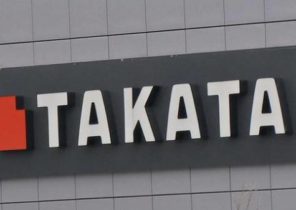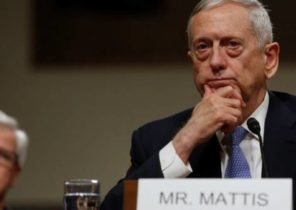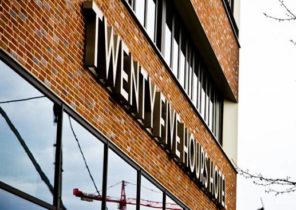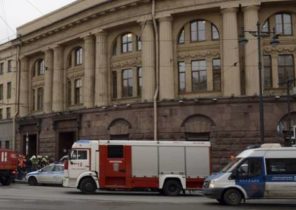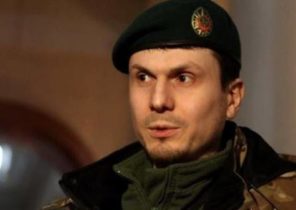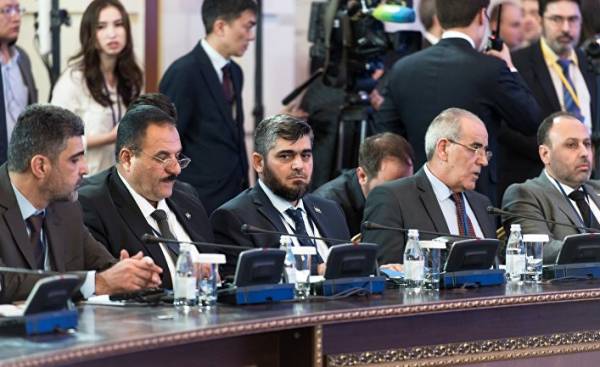
The consequences of the crisis in Aleppo continues. The fall of the city resulted in a failure for a phase in the Syrian settlement. The meeting in Astana was not in vain, although, in fact, the only result was the establishment of a cease-fire. This will undoubtedly affect the results of the next round of negotiations in Geneva.
The Syrian military groups, took part in the meeting in the capital of Kazakhstan, has pledged to cease fire, and then began to call for the liberation of Syria from Russian and Iranian presence while trying to reconcile these actions with Moscow. However, it is quite a difficult task, given that previously these groups were accused of terrorism. The leaders of the “National coalition” were originally set up more aggressively and refused to meet with Russian. But two days ago a meeting was held with Deputy Minister of foreign Affairs of Russia Mikhail Bogdanov where they discussed the formation of the delegation from the opposition in the next round of negotiations. Finally, agreement was reached on the formation of the “Higher Committee on negotiations”, which in addition to the opposition will participate Moscow and Cairo.
Also one of the conditions was that Turkey too will have a voice. Threats and discontent on the part of many members of the moderate and radical opposition… And now they’re all in the same boat with Russia, which not only puts pressure on the group, and walks on the parade ground and build them to attention in the settlement of the crisis, while preparing to expand its presence to participate in the struggle for the liberation of Raqqa.
The number of participants in the Syrian issue is not limited to the above-mentioned parties. The crisis has entered the stage of discussing options for settlement, and all conflicting parties in Syria looking for new solutions. Iran, which has insisted and continues to insist on its merits in the Levant could boast that he had prevented the fall of the regime. But now he fears a potential Grand bargain between the Kremlin and the White house. The most that he can expect at the end of the conflict, it offered him economic conditions, as well as some political guarantees and security.
A large part of the ambitions and aspirations of the militia will be implemented, if will see the light of transaction security of the road Damascus — Beirut, because it continues to be a connecting bridge in the region. They are interested in and establish control over the Hezbollah in the West of Syria in areas on the border with Lebanon, especially in the region Kalamun, as well as the representation under the new regime. A period of uncertainty in this situation will not last more than two or three months, until the plans of Washington in the matter of cooperation with these groups.
Jordan, in turn, quickly moving toward the coordination of their actions with the Russian troops, and Jordanian planes have already started to make raids on the positions of ISIS on the southern front. The country’s leadership, as before, continues to Express its readiness to participate in the fight against ISIL. The Jordanian troops even participated in the liberation of Palmyra after its first capture by the Islamic state. However, requests to the previous U.S. administration on the strengthening of the air forces of Jordan on the financing of the technology needed for night raids were useless.
The Russian did not want the increase in the number of local groups supported by Iran. The Americans, for their part, make decisions about expanding its presence in Damascus. This trend marks the beginning of the Arab-Turkish project, intended to block the expansion of Iran, and to block the possibility of “Forces of popular mobilization” (the Iraqi coalition supported by Iran — approx. lane) to cross the border to fight ISIS. The government of Binali Yildirim sent a foreign Minister Mevlut Cavusoglu to Saudi Arabia to coordinate their actions with Riyadh, which has repeatedly stressed an interest in helping in the operation to liberate Raqqa. Also, the Turkish government invited the Director of the CIA Mike Pompeo plan to liberate the city without the use of the Kurdish forces collaborated with the Obama administration that provided the last necessary assistance from the time of the battle for Kobani and Manbij. These shifts complicate the situation in Damascus and provoke anger, especially towards Russia, perceiving everything that is happening in silence.
For anybody not a secret that Moscow wants to close this page. She is interested in the management of the new phase of the conflict, and the quest to lead the settlement at any cost. But, of course, act alone she can’t: there are other players. However, they do not want to have partners who at the same time will be competitive for them. This is the essence of the problem between Moscow and Tehran. Everyone knows that regaining control of ISIS over Palmyra still remained unanswered. Russian troops could rely, as it happened for the first time, regime forces and militias supported by Iran. But this is no longer happening. The Kremlin has taken a wait and see attitude, wanting to know what opinion will be formed in Washington.
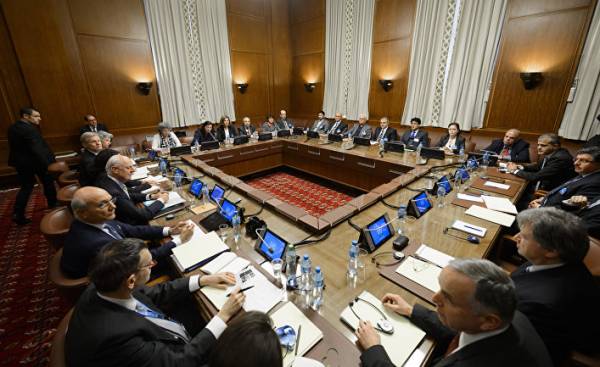 © AFP 2016, Fabrice CoffriniВо negotiations on Syria at the UN office in Geneva
© AFP 2016, Fabrice CoffriniВо negotiations on Syria at the UN office in Geneva
Don’t expect too much from the next round of talks in Geneva. It is known in advance that the President trump is not actively involved in this tour. While Washington is in the process of examining their policies in relation to the Syrian crisis, he will not participate in the meetings. But if the actions between America and Russia is not agreed, then why waste time? In addition, Russia’s position indicates a clear desire to complete this long process and close the Chapter called Geneva, announcing that competing political forces failed to agree on a final political solution.
Thus, Russia actively sought to find an alternative. For example, the reconciliation of the leadership of the regime with leaders of armed groups present at the meeting in Astana, as well as the obligation on the cease-fire for both sides. And all this with the participation of Jordan and Turkey, have large military forces in the North and the South. Missing at the meeting in Astana, the groups are unlikely to protest against these decisions. Moreover, the new US administration expressed uncertainty all present in the region of political and military forces, taking decision on the termination of arms supplies and expanded financial assistance. It should be noted that the previous administration put the United States to these groups, an impressive number of weapons in recent months.
Moscow is guided by the model of Egypt, where the military had the opportunity to rectify the situation, and in a similar scenario in Libya, when the army led by General Khalifa the Haftarot opened previously closed doors. The Kremlin is counting on a compromise between two opposing sides in the regular army and armed groups. These two parties able to form a new army will take over the management of the transitional period to pave the way for a system that will satisfy both internal and external forces. The device state will be based on the division of power between President and Parliament. Proposed by the Russian leadership of the project of the Constitution appeals to the interests of the Syrian people and in fact turns the page of the Assad regime. But at the same time, the document did not provide the opposition what she wanted. The Kremlin did not the entire system democratic, as demanded by the opposition forces. No doubt to turn the page of the former regime, Bashar al-Assad must remain President, making it easier for trump and Putin the coordination against ISIS and the necessary changes in Syria.
As for Ankara, which these days is configured more aggressively than usual, she expects a great relationship with Moscow on the one hand, and newly open doors in relations with Washington on the other. If active diplomacy in this period will bear fruit, much of what was lost can be restored. It will be possible not only to reduce the influence of Iran in the region, but also to limit the ambitions of the Kurds. In the plans of Turkey to expand its influence on North from El-Baba to Manuja in the future to Raqqa. It also seek to strengthen relations with Russia, which, however, is not going to deploy forces there. Moscow at this time is in a hurry to withdraw troops in accordance with the rules that she herself established at the outset of the intervention in September 2015. But each of the scenarios, aiming for Vladimir Putin and Recep Tayyip Erdogan may in fact not work.
The settlement will not start if Washington is to push for the creation of a security zone jointly with Ankara. Such a development would entail restrictions on the movement of Russian forces and reduction of influence in the region. Russia is using Syria as a foothold, not used to objections. It will seek to maintain its role in the creation of the regional system, from which it will be able to get the maximum benefit in the realization of their interests in the greater middle East.
Whether trump and Erdogan to provide security in the region without arousing the wrath of Putin? Or they will disrupt the plans of the Russian President and push him to thoughts about returning to Iran?
